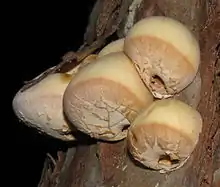| Cryptoporus volvatus | |
|---|---|
 | |
| Scientific classification | |
| Kingdom: | |
| Division: | |
| Class: | |
| Order: | |
| Family: | |
| Genus: | |
| Species: | C. volvatus |
| Binomial name | |
| Cryptoporus volvatus | |
| Synonyms | |
| |
Cryptoporus volvatus is a polypore fungus that decomposes the rotting sapwood of conifers. It is an after effect of attack by the pine bark beetle.[1] The fungus was originally described by American mycologist Charles Horton Peck in 1875 as Polyporus volvatus.[2] Cornelius Lott Shear transferred it to the genus Cryptoporus in 1902.[3] The species is inedible.[4]
The fruiting body is 2–6 across, and cream or tan in color.[5] A hole is either torn by insects or a tear appears on the underside.[5] The spores are pinkish.[5]
References
- ↑ Davis, R.M.; Sommer, R.; Menge, J.A. (2012). Field Guide to Mushrooms of Western North America. University of California Press. p. 341. ISBN 978-0-520-27108-1.
- ↑ Peck, C.H. (1875). "Report of the Botanist (1873)". Annual Report on the New York State Museum of Natural History. 27: 73–116 (see p. 98).
- ↑ Shear, C.L. (1902). "Mycological notes and new species". Bulletin of the Torrey Botanical Club. 29 (7): 449–457. doi:10.2307/2478544. JSTOR 2478544.
- ↑ Miller Jr., Orson K.; Miller, Hope H. (2006). North American Mushrooms: A Field Guide to Edible and Inedible Fungi. Guilford, CN: FalconGuides. p. 427. ISBN 978-0-7627-3109-1.
- 1 2 3 Davis, R. Michael; Sommer, Robert; Menge, John A. (2012). Field Guide to Mushrooms of Western North America. Berkeley: University of California Press. p. 341. ISBN 978-0-520-95360-4. OCLC 797915861.
This article is issued from Wikipedia. The text is licensed under Creative Commons - Attribution - Sharealike. Additional terms may apply for the media files.